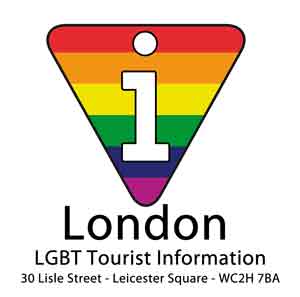Many of us have already talked ad nauseam about the rules governing Tube behaviour. No eye contact. All extremities and personal belongings to yourself. Never strike up a conversation with your fellow passengers (unless it is to moan about a delay or some noisome activity going on in a station).
However, we have also observed many exceptions to these rules, mostly in the form of young couples and Public Displays of Affection in varied locations and to varying degrees of intensity.
Beyond this, I have noticed that the LGBT community- particularly lesbian couples and cross-dressers/transgendered individuals- is extremely present here in London. As a group, they seem much more open and accepted here in London than some of the other cities I have been in. What the cause is, I don’t know- perhaps it has to do with the laws (I believe gay marriage is legal in England)? As someone who has and has had LGBT friends, I heartily applaud the apparent acceptance the community enjoys here.
 [From one of the LGBT London support sites: http://www.pinknews.co.uk/images/kulgbt.jpg]
[From one of the LGBT London support sites: http://www.pinknews.co.uk/images/kulgbt.jpg]
Anyway, as I was making my way back to the Arran House one day, I had an encounter with a lesbian couple that broke almost all the English rules of behaviour (not THAT kind of encounter . . . don’t get too excited, gentlemen)
I was transferring from one line to another and noticed two women in front of me holding hands and I remember thinking to myself “Awww, how sweet. I wonder if they’re sisters? Or . . . are they a couple?” While the TV show The L Word may be set in Los Angeles, I have not seen many gay couples – particularly lesbians- who feel comfortable enough to openly express affection in public.
We ended up in the same Tube car and the only open seat happened to be next to one of them. The other, a heavier woman, sat opposite and, within seconds of the doors closing had started fighting with the teenage girl sitting next to her (who, interestingly, looked and sounded to be foreign, not White-British). I quickly assessed the situation: both women were black, but the heavier one (who clearly was the femme in the relationship) was strongly taking on the Angry Black Woman persona while her partner (who was very butch) didn’t interfere except to say, “Do you have a problem with my girlfriend?” The butch lesbian was the one sitting next to me, so I turned to her girlfriend sitting across from me and asked if she wanted to switch seats with me so they could sit together. She seemed very surprised and pleased that I had offered but declined- I think she wanted to make the person sitting next to her uncomfortable for a little while longer (she said as much herself) and then leaned over and kissed her girlfriend next to me. As she continued arguing with her neighbour and generally drawing attention to herself, her girlfriend sitting next to me struck up a conversation, asking where I was from. As it turns out, she had visited the States once and stayed not 10 minutes from where I grew up! When the train got to their stop, both women took hands (the heavier one glaring daggers at her antagonist- frankly, I couldn’t decipher what the cause of contention was but it sounded like the issue had arisen from the woman’s size – maybe taking up too much seat room? – her race or her obvious sexual orientation) wished me a pleasant stay in England and departed.
After they got off the Tube, the girl who had been fighting with the heavier woman glanced at me suspiciously and then looked away. I’m still not certain what my crime was, that I was talking to people on the Tube at all, that those people were lesbians, or that they were black. Perhaps a combination of all three.
Since that incident, I have seen several more obviously-lesbian couples and some obviously-cross dressing or transgendered men walking around on the streets. From what I have observed and experienced, it seems to me that the gay community here is much more open, much more free about expressing affection and- as I experienced on the Tube- much more willing to break with the established rules of English social behaviour. And yet, the irony is there were still the restraints of other behavioural roles – the gay persona as well as the racial persona- coming into play. Perhaps the moral is that all people – English, American, black, white, gay, straight, whatever – are always adhering to some expected social code. We can reject some and embrace others but one is always present and guiding our public behaviour.
As a dedicated people watcher, I found this whole experience and the attention it made me pay to individual couples just fascinating. I tried very hard in my relation of it to use as netural and widely accepted terms as possible, hoping to cause no offense to anyone on any account.
